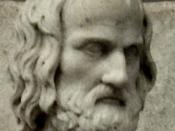Aristotle has long ago delineated a renowned definition of a Tragic Hero as 'an honourable protagonist with a tragic flaw'. This definition had been conveyed through time; from Euripides in ancient Greece to Jean Anouilh in 1940's France. In order to assess the degree of tragic heroism in both Euripides' Medea and the 'modern' Anouilh's Antigone it is essential to reminisce upon this definition with its further details, as will be clarified later on. By discussing the moral flaw, the role of foreshadowing and of dramatic irony used by the authors in both plays, the pattern of developing tragedy could be easily recognized and evaluated. Even though both protagonists appear to be 'tragic' in the end, Medea murders her own children while Antigone commits suicide, it is important to note that their tragic heroism is diverse due to the significant distinction between the characters of Euripides' and Anouilh's heroines. While passion drives them both, Medea is experienced, wise and cunning, whereas Antigone is portrayed as young, naïve and desperate to make a difference.
The best type of tragic hero, according to Aristotle, 'exists between these extremes . . . a person who is neither perfect in virtue and justice, nor one who falls into misfortune through vice and depravity, but rather, one who succumbs through some miscalculation'. Consequently, the hero has a 'moral flaw'; for example in Medea Euripides depicts a woman driven to violence because of her intense suffering. It can be inferred that Medea's character's hamartia is uncontrolled passion and a manner of 'speaking without thinking'. Euripides' protagonist employs the art of 'rhetoric' and with the help of effective diction he accentuates her past nobility intertwined with her flaw, the extremist infatuation: 'Medea:...but when she is wronged in her marriage bed, no creature has a mind more murderous'"...



Good!!
Good Essay!!! Very helpful
1 out of 1 people found this comment useful.